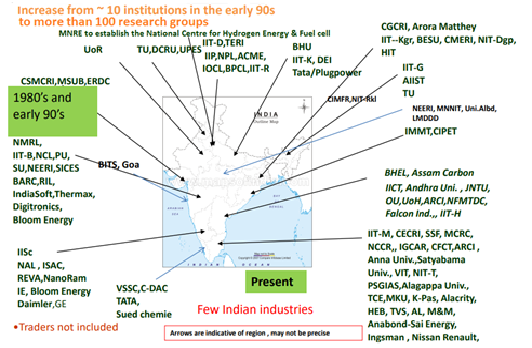Last Updated: February 2020 by Narasimhan Santhanam
This pos![]() t is a part of EV Next’s EV Perspectives.
t is a part of EV Next’s EV Perspectives.
EV Next, a division of EAI, is a leading market intelligence & strategic consulting firm for the Indian e-mobility sector.
Get to know about 1000+ EV innovations from EVI2: Electric Vehicle Innovation Intelligence from EVNext
Introduction
Fuel cells present a highly efficient and environmentally friendly alternative technology for decentralized energy production. A fuel cell is an electrochemical device which converts oxygen and a hydrogen-rich fuel to electricity with heat and water as the principal bi-products. The electricity produced can be used to power any electrical device, ranging from a few Watts to several MegaWatts in output. Fuel cells have the advantages of being highly efficient, low to zero emissions, near-silent, and able to run on a variety of fuel sources (particularly when used in conjunction with a reformer).
In addition, fuel cells are reliable and capable of providing uninterruptible power provided they have sufficient fuel. Indian fuel cell market is still in its nice stage, but there are major R & D activities happening in different research centres.
The following image, provided by the Centre for Fuel Cell Technology, ARCI, gives a birds-eye-view of the current research efforts taking place in the Indian fuel cell sector.
Hydrogen in Transportation Technology Development – Indian Scenario
| Organizations | Nature of Work | |
| H2-ICE | BHU | Transportation Application- Demo-2,3,4 wheelers |
| Universities, IITs | Transportation Application- Studies | |
| Bajaj, Birla, M&M, AL, Kinetic, Tvs | Transportation Application- Demo-2,3 wheelers | |
| Alkaline Fuel Cells | Bajaj, Brilla | Transportation applications |
| PEM FC | TATA & ISRO | System integration using bought out stack, Simulation for application |
| REVA | System integration using bought out stack, Simulation for application, 4 Wheelers | |
| Bajaj, Birla, M&M, Reva, Tvs | System integration using bought out stack, Simulation for application | |
| SSF, ARCI & Reva | 4 Wheelers Demo, Range extender | |
| M&M & ARCI | 3 Wheelers Demo, Range extender | |
| PAFC | Defense lab and Reva | 4 Wheelers Demo, |
Comparison between Battery Technology and Fuel Cell Technology for EVs
| Battery EV | Fuel Cell EV |
| Uses Energy stored in batteries | The sored fuel reacts to produce energy |
| Limited by range on a single battery charge | Less range limitations as they can store more fuel. The main disadvantage will be lack of sufficient infrastructure for hydrogen fueling. |
| Takes time to charge because of the system limitation in accepting the charge | Hydrogen fuel cell fueling is similar to that of gasoline counterparts. Centralised stations will be needed to dispense high pressure hydrogen. |
| Batteries have a limited cycle life . They will start degrading as they perform charging and discharging cycle. | Hydrogen fuel cells don’t have this problem. The membrane used in fuel cells also needs replacement but their life time is longer than batteries. |
Potential Applications of Fuel Cells
- Can be used in CHP mode
- Industrial applications
- Surface transportation
- Residential applications
- Power supplies for personal computers, hospitals, health clinics, etc.
- Electrification of remote locations/villages
Thrust Areas in Fuel cells
- Development of low temperature, medium temperature and high temperature fuel cells for decentralized power generation, automotive and other applications.
- Research in materials, technology development and up-gradation of the performance of fuel cells.
- Production of cost competitive fuel cells in India.
- Applications of fuel cell technology.
- Creation/expansion of infrastructure to support production and applications of fuel cells.
Ongoing Projects in Fuel Cells
- Development of Direct Alcohol Fuel Cell and Test Protocols (IIT Delhi).
- Solid Oxide Fuel Cells that operate directly on hydrocarbon feedstock (IIT Delhi).
- Development of High performance intermediate temperature solid oxide fuel cells (IT-SOFC) by low cost ceramic processing techniques (IMMT, Bhubaneshwar).
- Design and development of Alkaline fuel cell : Scaling up from bench scale i.e. 185 W to 500W (SICES Degree College of Arts, Science and Commerce, Ambernath (W), Mumbai).
- Development of high performance direct Methanol Fuel Cell (University of Calcutta).
- Development of PEM For fuel cell by plasma process (Institute of Advanced Study in Science Technology, Guwahati).
- Development of Non-fluorinated Polymeric Membrane for Direct Methanol Fuel Cell (Birla Institute of Technology, Ranchi).
Achievements – Ongoing Projects
- Indigenous base for research & industrial production being established.
- R&D projects are leading to technology/process/material development.
- Prototypes of PEMFCs and PAFCs developed.
- The application of fuel cells demonstrated for decentralised power generation.
- A Fuel Cell (PEMFC)-battery hybrid van has been developed in the country and has undergone field performance evaluation.
- 3 kW capacity UPS based on PEMFC developed.
- Reformer for a 10 kW PEMFC system developed and tested.
Organisations working in fuel cells
- Indian Institute of Technology Delhi, New Delhi
- Institute of Minerals and Materials Technology (IMMT), Bhubaneshwar
- Bharat Heavy Electricals Ltd. (BHEL), Hyderabad
- Central Electrochemical Research Institute (CECRI), Karaikudi
- Central Glass and Ceramic Research Institute (CGCRI), Kolkata
- Birla Institute of Technology and Science, Pilani (Goa Campus)
- Birla Institute of Technology, Ranchi
- Indian Institute of Technology Kanpur.
- Indian Institute of Technology Bombay, Mumbai
- National Chemical Laboratory (NCL), Pune
- Naval Material Research Laboratory, Ambernath
- University of Calcutta, Kolkata
- SICES Degree College of Arts, Science and Commerce, Ambernath (W), Mumbai
- Institute of Advanced Study in Science Technology, Guwahati
Read more on the EV Battery ecosystem from: EV battery Innovations | Components of BMS | FCEV Trends | FCEV Indian Efforts | Anode/Cathode R&D | Li-ion Battery Trends | BMS Innovations | Indian Battery Manufacturers | Cost of Li-ion Batteries | Anode Materials in 2020-2030 | Key Drivers shaping Battery Chemistry |
![]() Know more on how EV Next can assist your business in your strategy for the e-mobility and electric vehicles sectors, Here
Know more on how EV Next can assist your business in your strategy for the e-mobility and electric vehicles sectors, Here
Wish to know everything about India’s EV market from one place? Check out the India EV Expert Guide, an 800 page comprehensive guide to the Indian EV market. Here
Get to know about 1000+ EV innovations from EVI2: Electric Vehicle Innovation Intelligence from EVNext
See also the blog posts:
- Innovations in Battery Management System – BMS Technology Trends – Charging, Intelligence, Analytics
- EV Battery Innovations – New Anode/Cathode Chemistry, BMS, Nanotech for Electric Vehicle Batteries
- Innovative EV Companies in India – Pioneering Indian Startups in Electric Vehicles – Batteries, Scooters, BMS…
Comprehensive Inputs on Indian EV Ecosystem
Check out the following sections for comprehensive inputs on Indian EV ecosystem (click on each section for more details)





 Our specialty focus areas include
Our specialty focus areas include 





